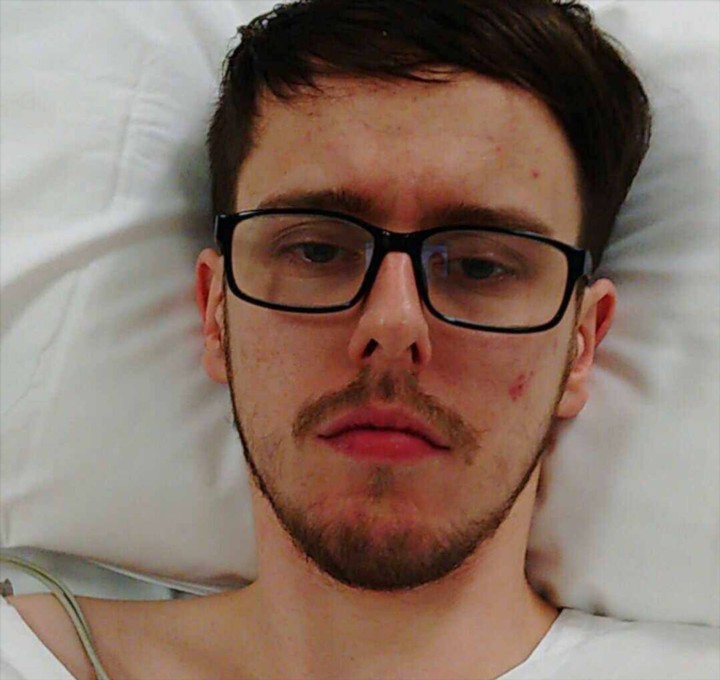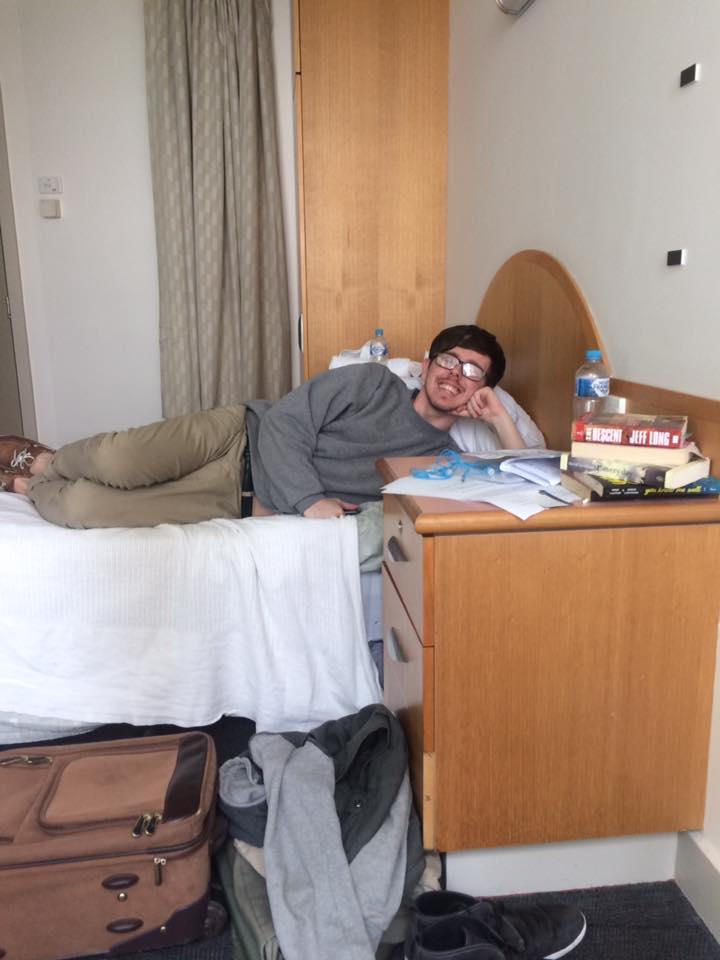--------

Me in hospital after a misuse admission
Scott Morrison unleashed the 2017 Budget in May and, unless you're a political journalist, it wasn't anything exciting. $6 billion in extra taxes for the big banks here, a cool $600 million for the Bureau Of Meteorology there. Oh, and the announcement that thousands of people on Newstart and Youth Allowance will soon be drug tested.
The decision was met with an immediate, furious uproar that neared "break #auspol" levels. Coming out in support of the scheme, Malcolm Turnbull offered, "The lesson is: Don't do drugs"—a sentiment with all the persuasive power of Frances McDormand's character in Almost Famous.
But what's been lacking in this debate—and in the decision-making process of Australian politics generally—is input from literally anybody in the health sector, or from those whose lives have been affected by substance abuse.
I fall into the second category. Over the past two years, the effects of crystal methamphetamine have wreaked absolute havoc on my life. It started when I was 22, and a beautiful man invited me back to his place after a night on the town. We got down to business, and then he offered me the pipe. I just remember drunkenly thinking, "This man is so good looking. I can't say no." My experience after that moment only serves to affirm my longstanding belief that hot people are the worst.
See, ordinary people might have taken this incident as a one-off, and carried on with their lives. For me though, my first time began a reckoning that took years to get under control. I knew it was a terrible drug, I'd heard all the nightmare stories. But within a week of that first experience, I heard a voice in my head gently whisper, "You could definitely do that again."
And so I did. Again, and again, and again. Repeating ad infinitum through the months, until monthly use became fortnightly, and fortnightly became weekly. At the start of this year, two years into my addiction, I'd upped my game to several times a week. It was that that point I decided to get myself to rehab.

Me in rehab
Only it wasn't as simple as taking myself there. With waitlists for public rehab impossibly long and private health cover too expensive, I had to turn to crowdfunding to get help. The response was overwhelming, and through the generosity of friends and strangers, I was able to afford a place at a private inner-Melbourne rehabilitation clinic.
What followed was weeks of intense withdrawals under strict psychiatric care. A simple text message while in rehab from someone I used to "use" with would send me into fits of inexplicable desire. It was hell. And it was one of the best decisions of my life.
I am someone who's lived through drug addiction, I've seen firsthand how it can come so close to destroying your life, which is why I think our government is making a huge mistake. I'd go as far as to say welfare drug testing will be destructive to Australian society. All of the evidence suggests this—from addiction research, to the results of welfare drug testing in other countries.
This is because as addicts, we're taught that slip ups happen. We're told lapses can, and do, occur. Recovering from addiction should never be viewed as a situation of "abstinence or death." It can only work if it's built on a foundation of sobriety "as best we can."
And there's a difference between a lapse and a relapse: A relapse is to take drugs again after a period of sobriety, and to fall back into old habits. It's collapsing under the weight of our own mistakes, until we believe that we're no longer worth the effort.
A lapse, or a slip-up, on the other hand, is to take drugs after a period of sobriety—and to know that it was a mistake, but that we can go on. It's not restarting the clock, and knowing that we haven't fallen off the proverbial horse. It's a long-game mentality, and a whole-hearted awareness that addiction is an ongoing struggle. It's me, lying in my bed after an error on the town, knowing that although today might fucking suck and I've made a mistake, tomorrow will be better. And the day after that. And after that.
I worry what would've happened to me if I tested positive to a welfare drug test during one of these lapses. If I got cut off from Centrelink entirely in one of the most vulnerable periods of my life. Even the proposed welfare alternatives seem problematic—imagine heading to the supermarket after a lapse and having to hand one of those Cashless Debit Cards over to the cashier. This symbol that your government feels you can't be trusted. What do you think could mute this guilt?
I know it seems small, but it matters.
Because these inevitable lapse periods can be incredibly vulnerable. There have been times I've tried to hide the problem from my family and been dishonest with my friends. Times I've hidden scorched track marks under long sleeves. There have been moments where I've lapsed, and the line between lapse and relapse has become so incredibly thin. Times of self doubt, as I lay in the midst of a comedown—or worse, a hospital visit from overuse—wondering, is this really going to be the rest of my life? Am I doomed to repeat this cycle, again and again, until it kills me? Or am I worth the struggle? Does my life have meaning enough to continue the fight?
When I heard Scott Morrison's announcement, I thought,Well, that's welfare done. I guess I'll be avoiding it altogether. And I know that others like me, too, will feel that burn. Maybe that's what some people hope will happen—for "dole bludging drug addicts" to be punished. But a welfare system that penalises addicts for lapsing is one that fundamentally misunderstands addiction.
I am someone who's actively trying to overcome my addiction. But even at the best of times, in the periods of success in my sobriety, I've been inexplicably met with that same whispering voice which doesn't belong to me—"You could definitely do that again." I've fallen off the wagon since getting out of rehab. More than once. I've caved to desire and failed at what I adamantly set out to achieve—sobriety.
But recovery doesn't always look like complete and total abstinence. Sometimes it looks like reducing your use, or developing strategies for change, or accepting your slip ups as being momentary hiccups. Just minor bumps in the road that's the rest of your life.
With government initiatives like drug testing welfare recipients; however, all of those psychiatrist-sponsored mantras go out the window. All that's left is the cold, steely gaze of poverty, staring in the face of those who need aid the most.
No comments:
Post a Comment